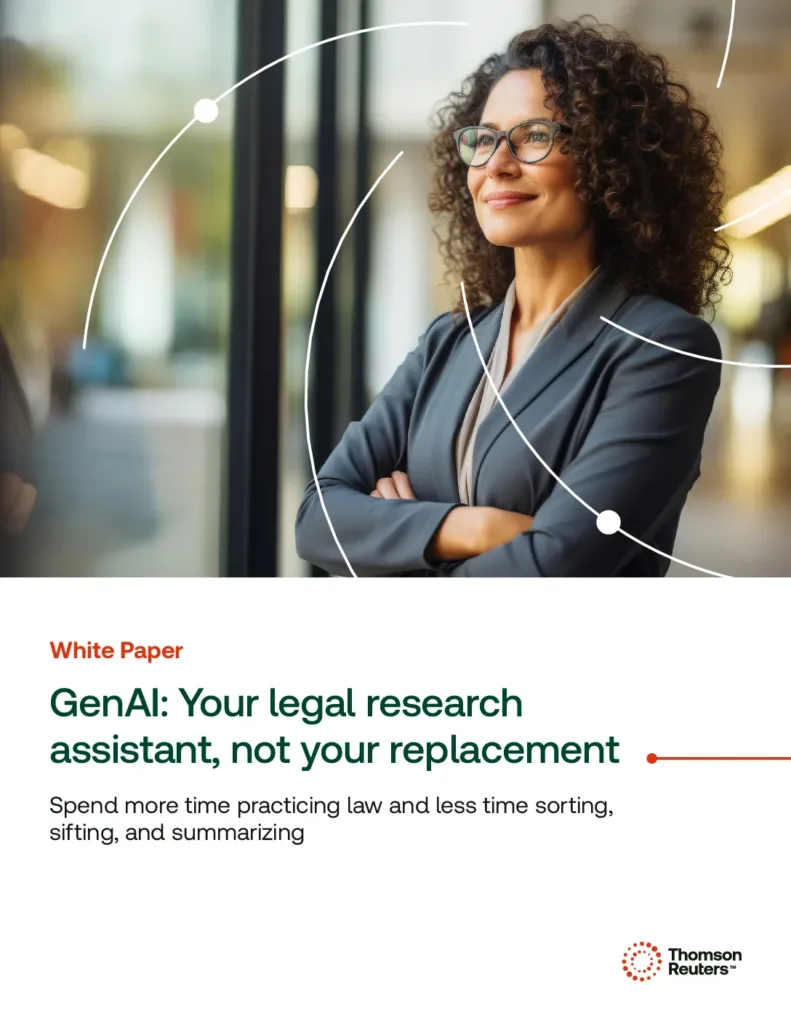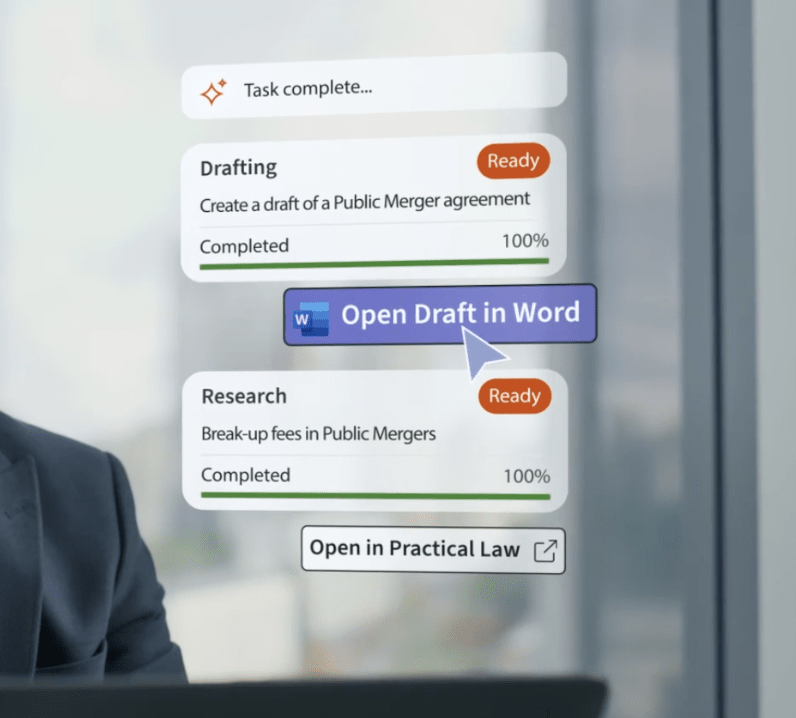Overview, list and guidance of primary, secondary sources, and the role of AI
Legal research is the systematic approach to discovering and comprehending legal data and materials to answer legal questions, support legal points, and make informed legal judgments. At its core, it’s akin to solving a jigsaw puzzle—combining elements of laws, case precedents, and expert opinions to find the necessary solutions.
To conduct thorough legal research, it’s crucial to pinpoint relevant legal sources, understand their context, and then apply the law to specific scenarios.
Jump to ↓
| Primary sources |
| Secondary sources |
| AI as a trusted source |
| Risks without human oversight |
| Other sources |
| A synthesis of sources |
Primary sources
Two of the most common resources attorneys use are primary and secondary sources. Primary resources encompass elements like constitutions, judicial decisions, statutes, and administrative rules and regulations. In addition to restating the law, secondary legal sources may provide commentary, analysis, description, explanation, or criticism.
The foundation of our entire legal system is firmly planted in primary sources. These sources are the primary authorities on the rules and principles of the law because they contain the first and most convincing evidence of those rules and principles.
Primary sources lay the groundwork for future legal debates, precedents, and conclusions. The judicial system relies on primary sources as a means of ensuring uniformity, fairness, and justice. Accessing fundamental documents like legislation, case law, and constitutions is like going straight to the legal system’s core. Experts in the law, like historians, need access to primary sources to fully understand the norms and notions that govern our daily lives.
Statutes
Statutes constitute the fundamental legislative framework of our legal system. They are established by legislative bodies, which may operate at the national, state, or local jurisdictional levels. Statutes contain many themes, from criminal offenses to environmental rules. They function as the fundamental basis upon which our legal framework is constructed. Like compendiums, they serve as a framework that directs the behavior of individuals, enterprises, and institutions, thereby fostering a well-organized and systematic community.
Regulations
Regulations can be understood as the practical application of statutes. Regulations provide specific and practical instructions to statutes, therefore converting abstract legal principles into tangible and implementable measures. Regulations can be conceptualized as instrumental mechanisms that facilitate the navigation of legal intricacies by governing bodies and individuals.
Case law
Case law can be understood as an ongoing interpretation and application of legal principles in real-life situations. The development of legal precedent is contingent upon the decisions rendered by courts in interpreting statutes and regulations within the context of particular legal disputes. The judicial system thoroughly examines the factual circumstances, legal contentions, and established principles to reach a determinative judgment in each case. These judgments establish legal precedents that serve as guiding principles for other cases of a similar nature.
Constitution
The constitution serves as the guiding instruments within a nation’s legal framework. It serves as protective mechanisms for fundamental rights and ideals, requiring all legislation to conform to these established standards. The establishment of a framework is responsible for delineating the processes involved in the creation, interpretation, and enforcement of laws.
Legal specialists acquire a comprehensive understanding of the complex dynamics of the legal system and safeguard the principles of justice, societal cohesion, and individual rights by examining statutes, regulations, case law, and constitutions.
Secondary sources
The analysis, discussion, and insights from secondary sources on primary legal writings are invaluable. Researchers benefit from their insight into the law’s background, consequences, and intricacy. Consider auxiliary resources as maps that reveal the intricate legal terrain:
Legal encyclopedias
First, there are legal encyclopedias, which are reference works that explain various concepts and phrases used in law. Think of them as a dictionary for the language of law. Legal professionals and the general public can benefit from the encyclopedias’ concise and clear explanations of complex legal concepts.
Articles and journals
Articles and journals in the field of law can be compared to a group of experts having a fireside chat. Articles written by academics, practitioners, and law students go deeply into topics, including analyzing recent cases and examining new developments in the field. These essays deepen our comprehension of the law by offering critical analysis, contrasting perspectives, and novel ideas.
Legal treatises
Third, there are legal treatises, which can be considered comprehensive analyses of a single area of law. These publications, written by leading solicitors, examine and explain complex legal topics at length. They help researchers navigate intricate legal topics by providing in-depth talks.
Legal commentaries
Fourth, legal commentaries provide insightful analysis of relevant statutes, court decisions, and legal principles. Researchers can better understand the effects of legal decisions and developments with the assistance of historical background, interpretations, and explanations provided by legal commentaries.
Case digests
Like a curated collection, case digests compile the most significant legal cases pertaining to a given topic. Researchers appreciate the concise summaries and highlights of these cases provided. If you’re looking for a summary of case law in a given field of law, a case digest is an excellent resource.
AI as a trusted source in legal research
The next generation of AI in legal research goes beyond traditional keyword searches by including more mature and reliable LLM capabilities. These systems are getting better at finding useful data and gleaning insights from limited, trusted sources such as expert curated volumes of case law, statutes, and regulations.
The question of trust and reliability is important since establishing trust in AI is essential. Large language models (LLMs) are an advanced form of generative AI and lie at the center of this debate.
LLMs are trained by using vast amounts of data from a range of sources, including books, blogs, news articles, Wikipedia information, social media posts, and other website content. LLMs are general purpose models that ‘understand’ a wide variety of domains and language constructs because of the diversity of the data on which they are trained.
Vice President, Product Management at Thomson Reuters
The scope of AI’s capabilities includes keeping tabs on the latest case law, optimizing workflow, and equipping staff members who aren’t lawyers to answer basic legal questions.
For overworked in-house counsel, AI can be a lifesaver. AI bridges the gap between insufficient resources and prohibitively expensive outside help, making legal research more widely available, more efficient, and less expensive.
The following three points apply to litigators across industries:
AI aids in understanding the broader context and potential ramifications of legal issues by recognizing trends, links, and anomalies in court judgments and statutes.
The ability to predict outcomes through predictive analysis and risk assessment is like having a virtual crystal ball. Like a watchful assistant who indicates potential dangers and advantageous terms, AI’s capacity to discover legal risks and opportunities in contracts and papers is akin to this.
More time and energy to improve the substance and strategy of legal work product instead of spending hours upon hours on the drafting and reviewing processes.
The risks without human oversight
Litigators need to be aware of LLMs current propensity to generate incorrect responses and create false impressions. LLMs can yield misleading information, even for straightforward inquiries. They may extract details from an irrelevant jurisdiction or an outdated case law, for instance.
Therefore, litigators should exercise utmost prudence. Professional judgment to verify and assess the accuracy of the outcomes is imperative.
Other sources
The Internet’s widespread availability has made it a convenient tool for conducting legal research. Google and other search engines are excellent places to begin when looking for broad overviews, recent legal developments, and fundamental legal ideas.
Libraries
Legal knowledge in libraries is still a valuable resource. Law students still prefer and need access to a law library’s comprehensive collection of books, periodicals, legal encyclopedias, and historical legal documents.
Professional research tools
Legal research technology is integrating LLMs like GPT-4 to boost litigator performance. However, their use requires careful consideration by attorneys. As LLMs are trained to perform legal research using mature legal content sets, these systems are becoming more prevalent.
The advanced search tools on these tools greatly improve the speed and precision with which legal professionals may find the information they need.
A synthesis of sources
Integrating digital research tools with traditional library materials is highly recommended. In addition to the breadth and trustworthiness of print materials, many libraries now provide online access to these same resources.
When combined, these digital and physical resources provide legal scholars with an unparalleled set of resources. Legal technology like Practical Law and Westlaw offer targeted and authoritative legal knowledge, while the Internet provides broad information. The ability to efficiently, accurately, and thoroughly understand the complexities of the law may require both free resources and digital tools.
Back your research with Westlaw content and Practical law editors
Expert attorney editors maintain and regularly update a comprehensive database covering all major areas of law, making Practical Law an indispensable resource for practicing lawyers. In addition to the standard fare of legal encyclopedias, this invaluable resource also includes supplementary readings that will deepen your understanding of the law.
AI-Assisted Research on Westlaw Precision with CoCounsel is built on our market leading content, utilizing our long history and expertise in AI.
Practical Law and Westlaw essentially show how tech progress and legal expertise can work together, transforming and boosting the impact of legal research for your firm or legal department.

White Paper
Unlock the hidden value in your legal department with data-driven insights
Access white paper ↗








